Mass of modern materials roam on different branches of the construction of day-to-day. Among these may be mentioned and plasterboard. The material is quite successfully won the construction market, It takes pride of place among the finishing. In particular, It is used for both internal, and for external works, that is its undeniable advantage. A recent modifications and moisture resistant coating compositions, it can be used in wet areas, allows the use of the bathroom and kitchen. Accordingly, it is possible to lay tiles on it, hence the question, on which glue tiles on plasterboard best place.
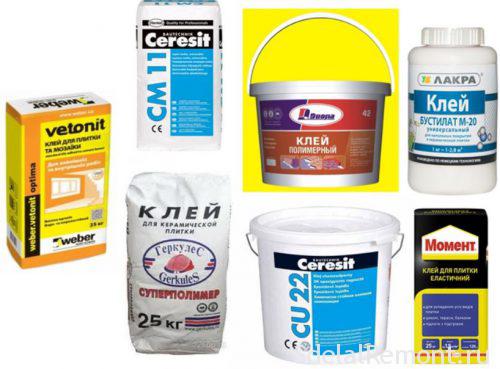
That is the question we try to answer fully. But first, you should understand, on which drywall can be glued tiles, and whether you can do it all.
Is it possible to lay tile on drywall
Let's start shall understand, on any surface you can lay tile, and on what not. And note, what laying on plasterboard the issue is controversial, because the glue is necessary in fact to paper. But at the same time, the answer is "YES". This is due to several factors:
- In the first place, such a surface is able to provide the maximum level of adhesion, that will ensure the reliability and durability of the coating. The most important, of course, It gets to decide, some adhesive to glue tiles on plasterboard.
- Just considering the use of an adhesive may be noted two valid species. This cement composition and elastic. Speaking of the first embodiment,, it allows you to perform a resistant coating and securely fasten materials. The second is more expensive, but it has improved adhesion properties with similar materials.
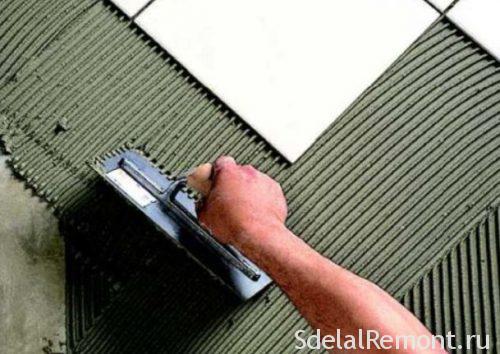
Another questionable point in the search for answers, on any surface to lay tiles, when it comes to drywall in the bathroom, is laying on the decorative elements. In particular, quite often this material is used to create decorative items, for example, cupboard under the bathroom. And here we note, that tiling is possible, and besides, It is the best solution.
The choice of materials
Important is the first choice, on any surface and with the help of which the glue tiles, taking into account the characteristics of the premises.
Plasterboard
To begin with, that the material itself is made from a combination of gypsum and paper from the cellulose. The end result is a unique material, which is an excellent tool for all kinds of operating under different conditions:
- Ecologicaly clean, which does not release into the environment of hazardous substances
- fireproof.
- There is a high strength.
- Pretty good thermal insulation properties.
- It should be added, it is easy to process, which makes it possible to perform any embodiment of designs and easily and inexpensively time (compared with other materials).
- Importantly, that even a person can engage in trim using drywall, having no special qualifications and experience.
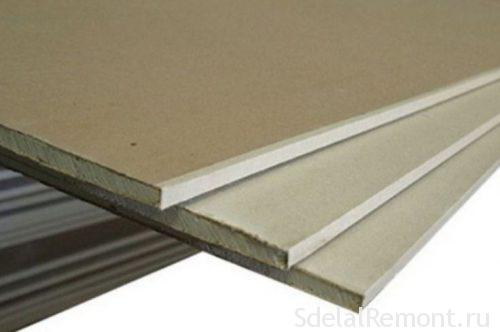
Talking about, on the basis of what lay tile, should first decide, What generally happens drywall. In total, the production of the material offers to the only two species:
- Standard plasterboard for normal conditions. In particular, for use in a stable temperature with a normal humidity level. Mostly used for decorative walls and ceilings, as well as the creation of partition walls in the rooms.
- GKLV - vlagostoykiy drywall. He intended use, decoration with high humidity levels, for example, kitchen or bathroom. Moisture resistance determines the presence of the hydrophobic impregnation, which actually allows for laying tiles on it.
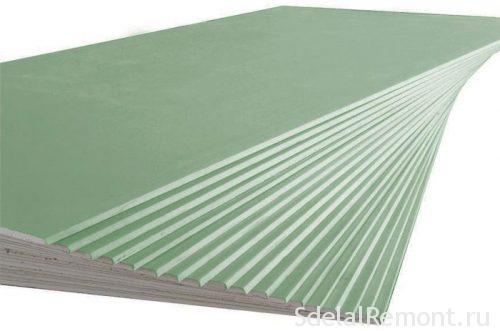
There is another kind - a fire-resistant drywall, but in this case there is no need to consider it.
also note, that the first version to use for tiling, and in addition to finishing a bathroom is not recommended. That is why it will not work. Respectively, the only species, which may be used, are moisture resistant plasterboard.
Glue
And it's time to consider, some adhesive to glue tiles on plasterboard best. To begin, a total need to be familiar with the types of compounds and then decide, which to choose, and after that go to the store for a new purchase.
In total, the construction market are presented to our attention the following types of blends:
- cement composition. This is a standard mixture for laying tile. It consists of cement, sand and other plasticizers, as well as modifying components.
- A good option can be the "liquid nails", at the base of which is incorporated water-dispersed substance.
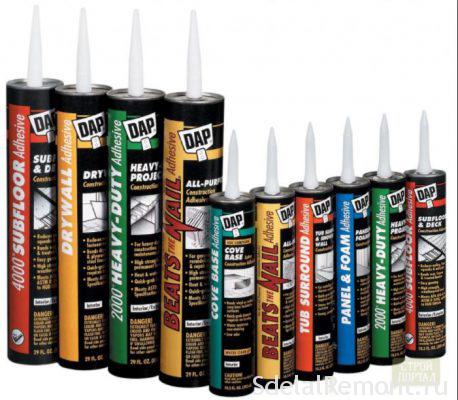
Usually, liquid nails used for the repair work on the tile
It should also provide here a little advice on the most adhesive. Knead it is only in such an amount, which you can use for a short period of time, such as glue quickly grasped and after the slightest drying will be impossible to use it. Besides, plant stands only on instructions.
And coming to the end, and finally, let us decide on what glue can glue ceramic tiles on plasterboard. And here it is worth noting a few choices:
- In cases, when the room there are constant microclimate differences (temperature and humidity), then your choice is best to stop on the elastic compositions, allowing the tiles to adapt to certain conditions. Accordingly hold it in this case will be as fast and efficiently. Thus will avoid different types of defects and cracks, and besides tiles falling off.
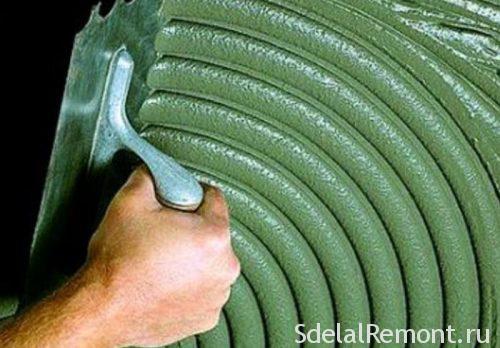
- But at the same time it should take into account the direction of economy. In some cases, lower cost cement composition makes it easy to choose. In the same time, it is also well suited for this kind of work, and just give in Epoxies.
Note some of the most quality and popular types of glue:
- A leader in the flexible adhesive market can be noted Ceresit CM. This composition is suitable for almost all surfaces, thus it has many advantages, including frost, moisture resistance, elasticity, resistance to deformation, Compatibility with waterproofing, etc.. This adhesive mixture is virtually ideal for such work. The main advantage of the composition is to prevent deformation of the coating, with voltages in the base (that often occurs with plasterboard).
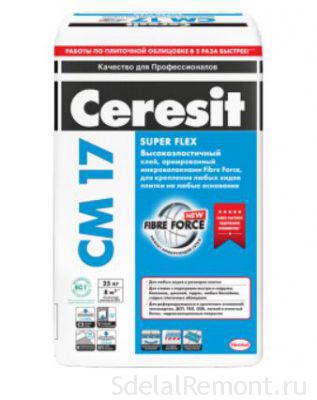
Excellent and elastic structure tiled - Another similar adhesive mixture - Elastic adhesive for tiles Moment. It is also suitable for all kinds of tiles, at the same time it is most often used for pottery. It has a high level of adhesion, materials resistant to slipping, and in addition waterproof.
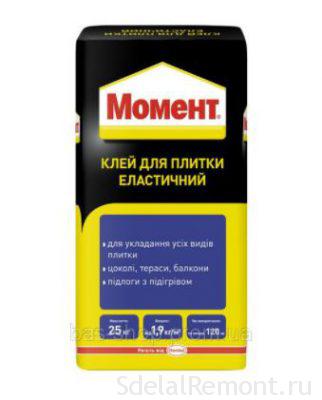
gaining popularity - follows, it is worth noting the glue from the manufacturer of gypsum products Knauf Flyzyn. This material is practically the best choice for a small budget, because it has the perfect combination of low cost and good quality. The adhesive mixture has a low consumption, some elastic characteristics (minor, but for use in a residential house with an average intensity of use in rooms with high humidity is perfect). Besides, adhesive mixture is great for laying tiles with high water consumption, it does not require pre-soaking. This tile adhesive recommended by the manufacturer Knauf, for gluing tiles to plasterboard.
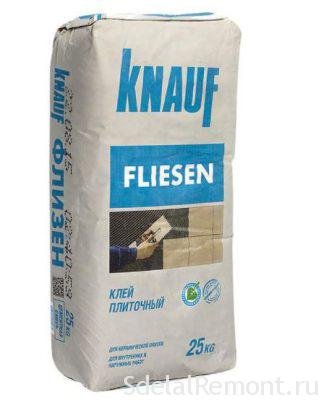
Perhaps, is the proven quality of the GL tile adhesive in the ratio of price and quality
After considering several examples of the highest quality adhesive mixtures, the choice is already behind you. It is best to cope with the task of laying a flexible mix, such as Ceresit CM 17, but a fairly expensive glue. The cost of adhesives in different regions of Russia starts at 350-700 rubles for packaging 25 kg. In the same time, rather qualitative, and the optimal solution would be to use a standard cement mixture with a small proportion of additives, for example, adhesive above Knauf, which cost 2-3 times less than. Here it all depends on your personal choice, and the financial capacity.
learn the right the amount of tile adhesive to help online calculator.
In preparing the tile adhesive, it is important to comply with the instructions and watch the time of the solution life. It is a guarantee of quality.
In conclusion we suggest to familiarize with multiple videos, which will tell you more about the tiling on plasterboard, preparations, including the selection of the adhesive mixtures in different operating conditions of the coating.












